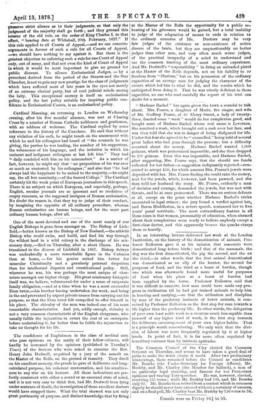Cardinal Manning, on returning to London on Wednesday evening, after
his five months' absence, was met at Charing Cross by a number of Roman Catholic noblemen and gentlemen, with an address of welcome. The Cardinal replied by some reference to the history of the Conclave. He said that without any violation of his oath, be might touch on the amusement with which he and his colleagues bad heard of "the counsels he was giving, the parties he was leading, the number of his supporters, the vehemence of his language, and the isolation in which his eminent and indignant colleagues at last left him." They had "daily condoled with him on his misconduct." As a matter of fact, however, he might say that "no proposition of his was ever so much as contested by his colleagues ;" and also that "he had always had the happiness to be united to the majority,—he might say, the all but unanimity,—of the Sacred College." The Cardinal certainly hit the weak point of European journalism in this speech. There is no subject on which European, and especially, perhaps, English, secular journals are so ignorant and so credulous of • empty rumours, as the supposed intrigues of Roman ecclesiastics. No doubt the reason is, that they try to judge of their conduct, by imagining the opposite of all ordinary procedure, whereas Roman ecclesiastics are human beings, and for the most part ordinary human beings, after all.


































 Previous page
Previous page